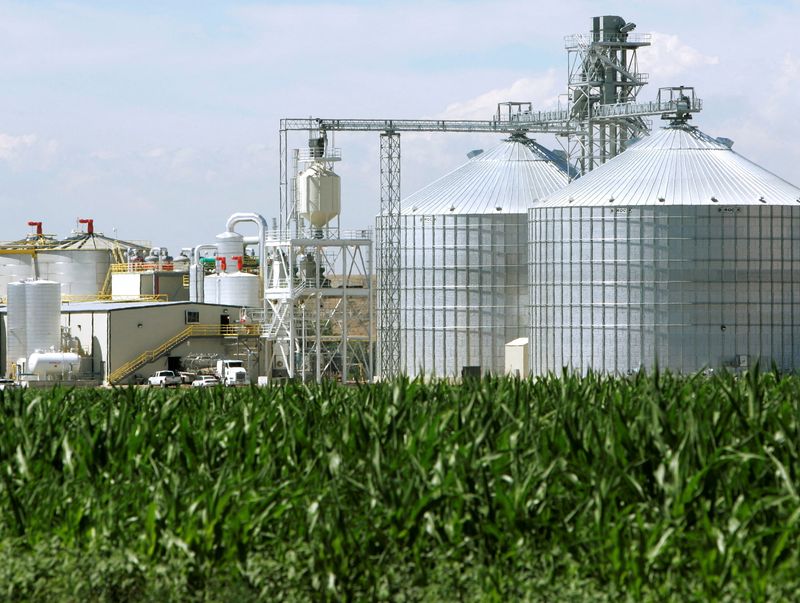By Jarrett Renshaw and Stephanie Kelly
(Reuters) - The White House is expected to announce in coming weeks the amount of biofuels like corn-based ethanol that U.S. refiners must blend into their fuel this year, a decision that will force it to weigh taming consumer inflation against supporting the nation's farmers.
How the administration balances the competing priorities could play a role in November's midterm elections, as high consumer prices pose a political threat to President Joe Biden's Democratic party and Farm Belt voters remain a crucial constituency.
The White House National Economic Council, led by Brian Deese, is pouring over numbers to gauge whether lowering blending mandates for ethanol and renewable diesel will help blunt rising food and fuel prices, according to two sources familiar with the process.
Cutting mandates for ethanol and advanced biofuels like biodiesel could theoretically cut food costs by reducing demand for corn, soy and other staple crops that have become more scarce since Russia's invasion of Ukraine. Trimming the mandates could also potentially take pressure off pump prices by reducing blending compliance costs for some oil refiners.
But doing so would anger farmers and the biofuels industry that insist the annual blending mandates are critical to supporting their livelihoods.
White House officials are meeting with lobbying groups representing oil and consumer goods giants, including the Food Manufacturing Coalition, American Bakers Association, American Petroleum Institute and Renewable Fuels Association, as they weigh the possible changes.
"I have never in the history of the program seen such a confluence of issues potentially impacting the outcome. If there was a perfect storm, this is it," said Michael McAdams, president of the Advanced Biofuels Association.
The Environmental Protection Agency sent its proposal on biofuel volume mandates for the years 2020 through 2022 to the White House for final review in late April. The proposal would retroactively lower the mandate for 2020 and 2021 but to boost it back up again for 2022, three sources told Reuters. The EPA declined to comment.
ETHANOL AND HIGH GAS PRICES
The U.S. Renewable Fuel Standard, enacted in 2005, requires refiners to blend biofuels like ethanol into the fuel pool or buy credits from refiners who do. The program has been an economic boon for states like Iowa and Nebraska, but smaller refiners who have not invested in blending facilities say the cost of buying credits threatens their plants.
U.S. credits tied to ethanol are trading at over $1.60 each, the highest since August, while biomass-based credits are over $1.80 each, near the highest since June. The ethanol credits, which traded as low as 8 cents apiece in early 2020, have remained at historically higher levels since last year.
Economists say some portion of the cost of the credits is passed on to consumers, resulting in higher pump prices. Some refiners and their union backers are encouraging the White House to lower the ethanol mandate below 15 billion gallons in 2022 to drive the credit costs down.
Without the cost of compliance credits, however, adding ethanol to the nation's fuel pool can actually reduce pump prices, by expanding the overall volume of available fuel using a substance cheaper than straight gasoline.
The White House earlier this year tapped into that dynamic by announcing it was lifting a ban on summer sales of higher ethanol blends of gasoline, called E15.
FOOD VS FUEL
Corn-based ethanol accounts for the overwhelming majority of blending under the RFS. In 2022, the EPA proposal would require refiners to blend 15 billion gallons of ethanol and 5.77 billion gallons of advanced biofuels.
In recent years, while ethanol demand has remained stagnant, demand for advanced biofuels like renewable diesel and sustainable aviation fuel has surged as states like California and Oregon adopt their own renewable fuel mandates. That has swollen demand for oilseeds like soybeans and canola that serve as biofuel feedstocks and compete with other food crops for finite planting area.
The edible oils are used in everything from cakes, chocolate and frying fats to cosmetics, soap and cleaning products.
Robb MacKie, president of the American Bakers Association, which includes companies like Kroger (NYSE:KR) Co and Tasty Baking Company, first raised concerns about supply and prices for these products with the EPA last year, asking that blending levels be rolled back to 2020 levels.
Then Russia's invasion of Ukraine in February made the problem worse.
Russia and Ukraine account for nearly a third of global wheat and barley production, and two-thirds of the world's exports of sunflower oil used for cooking. Also, Indonesia recently banned exports of palm oil, cutting off more than half of the global supply.

Soybean futures have risen over 20% so far this year to more than $16 per bushel, while corn futures have gained about 30% to over $7.90 a bushel.
"In light of what we are experiencing, the alarm bells are ringing," MacKie said.